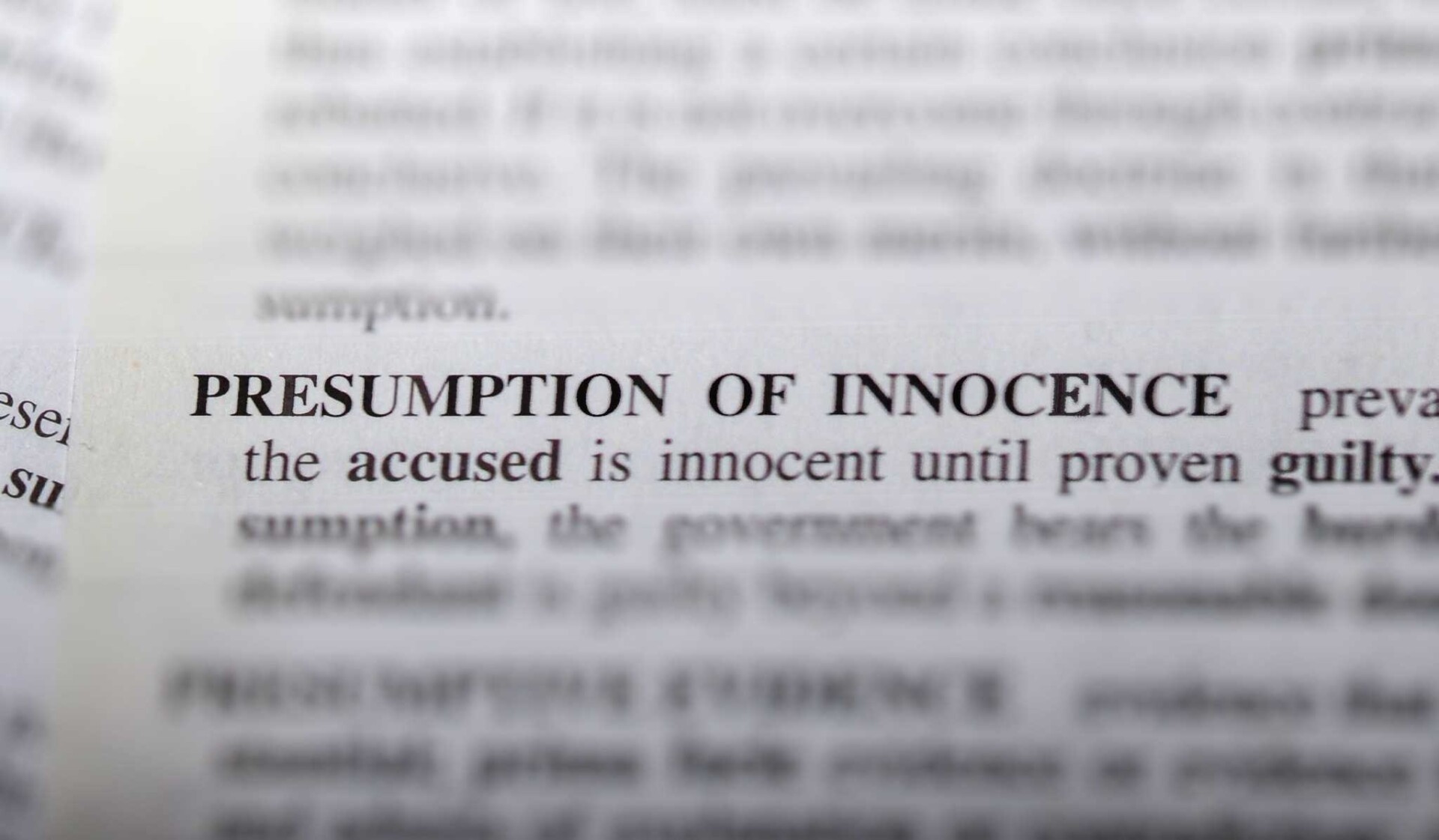
The presumption of innocence is a fundamental legal principle that protects individuals accused of a crime by ensuring they are treated as innocent until proven guilty. This principle is integral to fair trials, as it places the burden of proof on the prosecution, requiring them to present strong evidence before an accused person can be found guilty.
In Australia, this concept is deeply embedded in the legal system, playing a crucial role in protecting individual rights and upholding justice.
How Does the Presumption of Innocence Work?
In practice, the presumption of innocence means that an individual is innocent unless proven guilty. The prosecution must prove beyond a reasonable doubt that the accused committed the crime, ensuring that no one is wrongfully convicted.
The defendant is not required to prove their innocence, which helps protect against unjust convictions. This principle is safeguarded by both local laws, such as Australia’s Evidence Act 1995, and international human rights standards. If you’re dealing with a criminal defence case, understanding this process is crucial.
Historical Origins of the Presumption of Innocence
The concept of the presumption of innocence has deep roots in history. It can be traced back to Roman law, where the saying “the burden of proof lies with the accuser” became a foundational rule.
Over time, this principle was adopted into English common law, which has significantly influenced the legal systems of many countries, including Australia. The innocent until proven guilty standard has since become an essential aspect of criminal justice systems worldwide, helping to shape fair trials and protect individual freedoms.
The Presumption of Innocence in Different Legal Systems
While the presumption of innocence until proven guilty is a core principle in many legal systems, the way it is applied can vary depending on the type of legal system in place. A brief comparison of common law and civil law systems provides valuable insight into these differences.
Common Law Systems
- In common law countries, such as Australia, the UK, and the US, the presumption of innocence is central to criminal justice. The prosecution carries the burden of proof, and the accused is considered innocent until proven guilty beyond a reasonable doubt.
- Trials in these systems are adversarial, meaning both the prosecution and defence present evidence before an impartial judge or jury. This process ensures a fair hearing, with the presumption of innocence acting as a safeguard for the accused.
Civil Law Systems
- In contrast, civil law countries such as France and Germany follow an inquisitorial process. Although the presumption of innocence is still recognised, judges play a more active role in investigating the case.
- Here, the burden of proof still rests with the state, but the investigative nature of the system means that the court itself seeks out evidence, reducing the adversarial element found in common law systems.
Inquisitorial vs Adversarial Systems
- Inquisitorial systems, typically found in civil law countries, place more responsibility on judges to determine guilt or innocence. The judge actively investigates, interviews witnesses, and examines evidence, but the presumption of innocence remains a key principle.
- In adversarial systems, like in Australia, the judge or jury serves as an impartial party, while the prosecution and defence build their cases independently.
These comparisons illustrate that while the presumption of innocence is a shared principle, the legal processes that uphold it can vary significantly between different legal systems.
The Role of the Prosecution: Proving Guilt Beyond a Reasonable Doubt
One of the key aspects of the presumption of innocence is the prosecution’s responsibility to prove guilt. In any criminal trial, the prosecution must present sufficient evidence to prove beyond a reasonable doubt that the accused is guilty.
Whether you’re dealing with sexual offences or defending yourself against fraud offences, this standard ensures that no one is wrongfully convicted based on insufficient evidence.
Without meeting this burden of proof, a defendant cannot be found guilty. This ensures the legal system remains fair and just, preventing the misuse of power and protecting against wrongful convictions. In Australia, the legal process emphasises this standard in every step, from investigation to trial.
Protecting Individual Rights Through the Presumption of Innocence
The presumption of innocence serves as a vital safeguard for individual rights. It prevents authorities from detaining or punishing someone without solid evidence of wrongdoing. This protection is essential in ensuring a fair legal system.
In Australian courts, this principle influences every criminal trial, helping to maintain fairness and prevent arbitrary actions by the state. From the point of arrest through to the trial, defendants benefit from this legal protection, ensuring they are innocent before proven guilty.
The Impact of the Presumption of Innocence on Bail Decisions
The presumption of innocence plays an important role in bail decisions. When an individual is accused of a crime, they are still considered innocent unless proven guilty, which means they should not be held in custody without a valid reason. Bail allows the accused to remain free until their trial, provided they pose no danger to society or risk of fleeing.
Judges must balance the rights of the accused with concerns for public safety when deciding on bail conditions. The presumption of innocence ensures that these conditions are not unnecessarily harsh, protecting the individual’s right to freedom before a conviction is secured.
Balancing Justice and Fairness in Trials
A fair trial is crucial to maintaining justice, and the presumption of innocence is at the heart of this process. It ensures that every accused individual is given a fair opportunity to defend themselves, with the prosecution bearing the responsibility of proving guilt.
This principle helps prevent the state from misusing its power and ensures that justice is served through proper legal channels.
In Australia, several legal safeguards uphold the presumption of innocence during trials. These include the right to a lawyer, independent judges, and strict rules on evidence. Together, these elements create a system that promotes fairness and accountability in the pursuit of justice.
Common Misunderstandings About the Presumption of Innocence
Despite being a well-established legal principle, there are common misconceptions about the presumption of innocence:
Misconception 1: Being Charged Equals Guilt
Some people mistakenly believe that being charged with a crime is equivalent to being guilty. However, this is not true:
- Being charged only indicates that there is sufficient evidence to bring the case to trial; it does not imply guilt.
- The presumption of innocence ensures that guilt must be proven beyond a reasonable doubt before any conviction can take place.
This principle safeguards individuals from premature judgments and helps maintain fairness throughout the legal process.
Misconception 2: The Principle Only Protects Criminals
Another common misunderstanding is that the presumption of innocence only serves to protect criminals. In reality, this principle benefits everyone:
- It ensures that no one is wrongfully convicted without substantial evidence being presented.
- It applies to all individuals facing legal proceedings, ensuring that fairness is upheld for everyone, not just those who may have committed a crime.
The presumption of innocence remains a key pillar of justice, preventing wrongful convictions and protecting the rights of all citizens.
Challenges to the Presumption of Innocence
Despite its fundamental role in protecting individual rights, the presumption of innocence faces challenges, especially in high-profile cases. Issues such as media influence and laws related to child abuse material can complicate fair trials. Public opinion and sensationalism may create bias, threatening the fairness of the legal process.
Key challenges include:
- Pre-trial detention practices:
- Accused individuals may be held in custody for extended periods before their trial.
- This detention can create a perception of guilt, despite the principle of being innocent until proven guilty.
- It places an unfair burden on defendants, who face legal and financial strain while being detained.
- Media influence and trial by public opinion:
- In high-profile cases, media coverage can shape public opinion long before the trial begins.
- Sensationalism and biassed reporting may lead to public pressure on courts and juries.
- Such influence can threaten impartiality, undermining the fairness of the legal process.
- Counter-terrorism laws:
- These laws, designed to protect public safety, sometimes allow for the detention of individuals with limited access to due process.
- Such measures can erode the safeguards offered by the presumption of innocence.
- In certain cases, individuals may face prosecution without sufficient evidence being presented or thoroughly examined.
These challenges underscore the importance of maintaining strict adherence to the presumption of innocence, even in the face of complex legal and societal pressures. Protecting this principle ensures that justice is applied fairly and consistently for all individuals.
Exceptions and Limitations to the Presumption of Innocence
While the presumption of innocence is a fundamental legal principle, there are certain situations where the burden of proof may shift from the prosecution to the defence. These exceptions are typically introduced for public safety or policy reasons.
Key exceptions include:
- Strict liability offences:In these cases, the prosecution does not need to prove the accused’s intent or knowledge of wrongdoing. Common examples include traffic offences or certain regulatory breaches, where the defendant is automatically deemed liable unless they can prove otherwise.
- Reverse onus provisions: These legal provisions place the burden on the accused to prove specific facts, such as not being in possession of illegal substances. Reverse onus is often used in serious cases, such as drug trafficking or terrorism offences, where public safety is a major concern.
These exceptions, though rare, highlight situations where the presumption of innocence is not absolute. They are generally justified by the need to deter criminal activity and protect society, but they remain controversial for challenging the usual burden of proof standards.
The Importance of Evidence in Upholding the Presumption of Innocence
The presumption of innocence places great emphasis on the importance of evidence. Without credible and compelling evidence, accusations alone are not enough to convict someone of a crime. This requirement ensures that the legal system operates fairly, preventing baseless allegations from leading to wrongful convictions.
The prosecution must present clear and convincing evidence to prove that the accused is guilty of a crime. This strict standard ensures that innocent individuals are not unjustly punished and that only those who have committed crimes face legal consequences.
Maintaining the Presumption of Innocence in the Digital Age
In the age of instant communication and social media, protecting the presumption of innocence requires:
- Careful management of pre-trial publicity: Limiting exposure to prevent public judgement before a fair trial takes place.
- Education about the importance of fair trials: Ensuring the public understands the value of the presumption of innocence in the justice system.
- Responsible reporting by media outlets: Encouraging media to report carefully, avoiding sensationalism that could influence public opinion or jeopardise a fair trial.
These steps are essential to uphold the integrity of the legal system in the digital age, where information is quickly shared and often misinterpreted.
The Presumption of Innocence as a Cornerstone of Justice
The presumption of innocence remains a crucial element of legal systems around the world, including in Australia. It ensures that everyone accused of a crime is treated fairly, with the burden of proof resting on the prosecution.
By requiring that guilt be proven beyond a reasonable doubt, this principle protects individual rights and upholds justice, ensuring that no one is wrongfully convicted without strong evidence.
Protect Your Rights with Legal Support
If you are facing legal challenges, it is essential to seek expert legal advice to protect your rights under the presumption of innocence. Ensure you have the right defence in place by contacting KPT Legal for guidance and support.















